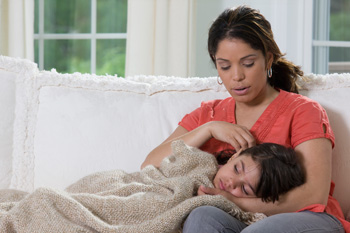While we all hope for a fresh, healthy start in 2016, various stomach “bugs,” common colds and strains of the flu may get the better of us and our children. As parents and teachers, we want to encourage good attendance in school, but there are times when it’s definitely safer for everyone if we keep our germs out of the classroom. With that in mind, Dr. Kate Land offers some sound advice on how to identify just when your kid is too sick to go to school.
It was about 7:30 one morning 10 years ago when, while rushing to clean up breakfast, make lunches, dry my hair and convince three slow kids to move along I heard my son say, “Mom, I don’t feel so good!”
We have all had mornings where we have heard those words but – what do we do next? How do we know when to keep our kids home and when to send them off to school?
Part of our job as parents is to get our kids to school on time every day. Doing so helps ensure their success in school. We know this and yet, the decision about when a child is too sick for school can be a very difficult one.
While your decision must involve a healthy dose of common sense, here are some basic guidelines to help you:
- You child should not attend school if they have had a fever (temperature over 100.4) in the last 24 hours.
- If your child is contagious to other kids (some examples are: fever, vomiting, diarrhea, uncontrollable coughing, red and oozing eyes) she should stay home.
- Keep your child home if they seem too sick to be able to participate actively in school.
Here are more specific examples (each with links to help you know when it is time to see a doctor):
Fever:
If your child has had a fever in the last 24 hours, the child is likely contagious and does not feel well enough to participate in school.
Vomiting:
While one isolated urp is unlikely to be a reason to keep them home, vomiting right before school or twice within 24 hours should be a cause for staying home under your care. If vomiting is paired with belly pain, fever, decreased urination or an inability to take any liquids, see a doctor.
Diarrhea:
Some kids have chronically loose stools (often from drinking juice) but, if their poops have been watery or bloody or they have had three bowel movements in 24 hours you should consider keeping them home. Diarrhea can be from an infection.
Red eyes:
If the white of the eye is just slightly pink and the discharge is watery, your child should be good to go. However, if the eye is red, hurts or has yellow/green discharge, it is time to see a doctor.
Sore throat:
If a sore throat is accompanied by fever, swollen glands, rash or stomachache, then you should arrange for a strep throat test. If the sore throat is only paired with a bit of runny nose, the child may be well enough for school.
Rash:
A new rash on a child that does not feel well should be evaluated by a doctor. If the rash is accompanied by a fever, a doctor must see the child.
We know that school-aged kids get sick an average of 6-10 times a year – that’s a lot! There are a few things you can do to keep your child as healthy as possible:
- Teach them to wash their hands often. Most childhood illnesses are spread through germs shared by touch (one child wipes their runny nose and turns a doorknob and the next child who touches the doorknob gets the cooties). Helpful tip: they will do a more effective job of washing if they sing the ABC song twice through while sudsing up!
- Fully vaccinate your child including the yearly influenza vaccine. Vaccines are safe and effective.
 Know that, despite your best efforts, sometimes your choice will turn out to be wrong. You may send a sicker-than-you-realized kid off to school and get called by the school office. Or, you may keep your child home, only to be stuck with a way-too-healthy child bouncing around your home! To help avoid repeating that last scenario, I always try to make staying home very unappealing: no TV, no play dates and not too much fun with mom.
Know that, despite your best efforts, sometimes your choice will turn out to be wrong. You may send a sicker-than-you-realized kid off to school and get called by the school office. Or, you may keep your child home, only to be stuck with a way-too-healthy child bouncing around your home! To help avoid repeating that last scenario, I always try to make staying home very unappealing: no TV, no play dates and not too much fun with mom.
Sometimes children begin to try to avoid going to school. This can become a real problem with chronic absences impeding their ability to achieve in school. If you are struggling with a child who often seems to be asking to stay home, check out this toolkit from Attendance Works and this helpful resource on school avoidance from Kaiser Permanente for more guidance.
On that morning that I had a decade ago, I looked at my kiddo and said: “You have no fever, you aren’t throwing up or coughing, you look good enough to me so – hop into the car!” Off we went. Then, 3 hours later the school called me – the poor kid had thrown up. All over his teacher’s shoes. I’m guessing I will never live that one down!




